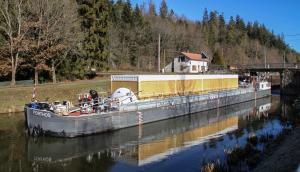Delivery
2,000 km through canals, locks and tunnels
18 Feb 2019
Manufactured under an ITER India contract by Linde Kryotechnik AG near Zürich, Switzerland, the "cryogenic termination cold box" reached the Rhône river valley through a network of small-gauge canals dotted with locks and tunnels.
When the thruway is closed, one takes the back roads. And when it's low-water season on the Rhine-Rhône canal, a barge leaving Switzerland for the Mediterranean has no other choice than to head north, then west, until eventually reaching the Rhône river valley through a network of small-gauge canals dotted with locks and tunnels.
For the last of the cold boxes needed for the ITER cryoplant, the journey must have seemed like a leisure cruise through magnificent winter scenery. For the transport organizers—ITER's global logistics provider DAHER and its contractor Compagnie Fluviale de Transport—it was a highly delicate operation.
The 63.5-tonne load travelled aboard a specialized heavy-duty barge, the Porthos, whose dimensions barely allowed it to pass through some of the locks.
The waterline of the barge had to be lowered enough to allow passage through the low-ceilinged tunnels, while keeping the ship's hull at a safe distance from the bottom of the canal.
To accommodate the height of the cold box (five metres), the waterline of the barge had to be lowered sufficiently to allow passage through the low-ceilinged tunnels while keeping the ship's hull at a safe distance from the bottom of the canal. This was achieved by adding a precisely calculated amount of ballast to the component's weight.
Despite these challenges, barge transportation has its advantages. "It offers a very smooth ride, with very few accelerations and vibrations," explains DAHER's operation manager Laurence Prudhomme. "And it's also cheaper than road transportation." Components on a barge travel slowly, but in safety and comfort.
For the last of the cold boxes needed for the ITER cryoplant, the journey must have seemed like a leisure cruise through magnificent winter scenery. For the transport organizers—ITER's global logistics provider DAHER and its contractor Compagnie Fluviale de Transport—it was a highly delicate operation.
From Switzerland, where the cold box was manufactured under an ITER India contract, to the ITER site, where it is expected on 20 February, the journey will have lasted more than three weeks. In all, a voyage of almost 2,000 kilometres through eight different canals, four tunnels and 250 locks.
Click here to view a short video of the barge as icebreaker.




